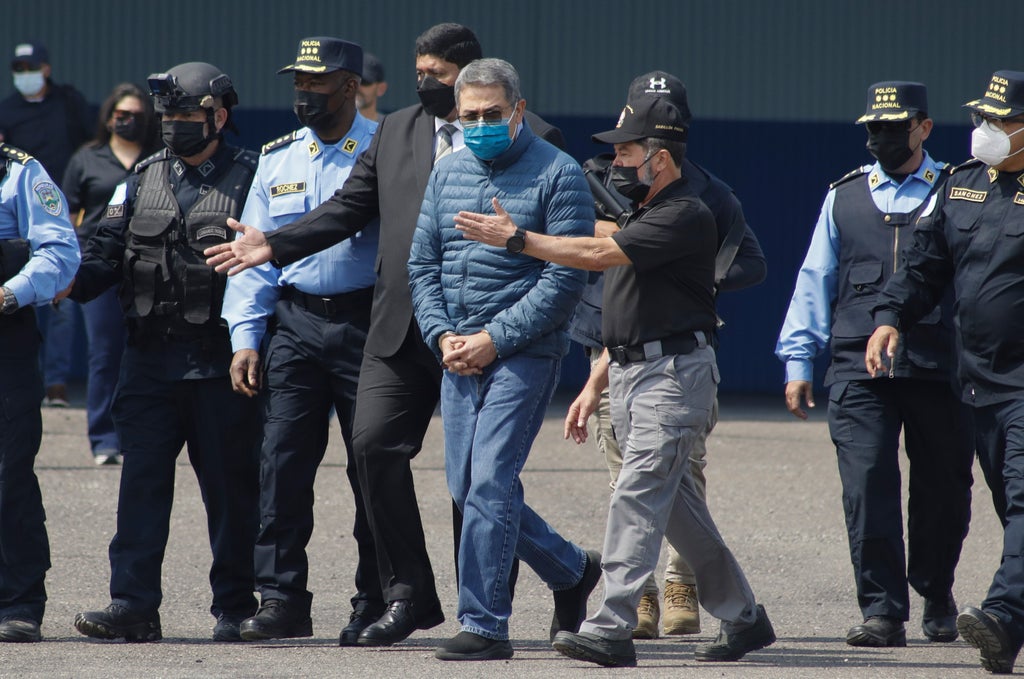
The former president of Honduras Juan Orlando Hernandez has pleaded not guilty to drug-trafficking and weapons charges in a federal courhouse in Manhattan.
Mr Hernandez, who served as president of Honduras from 2014 until last year, was extradited to the United States last month on charges that he used his position to faciliate and profit handsomly from the smuggling of hundreds of thousands of kilograms of cocaine into the US.
Mr Hernandez, who is also charged with posessing and using machine guns and other weapons, is facing life in prison. His brother, former Honduran congressman Juan Antonio Hernandez, was already sentenced to life in prison in the US last year for his role in a scheme to import some 185,000 kilograms of cocaine.
In the courtroom on Tuesday morning, Mr Hernandez acknowledged the presence of his supporters and then entered his not guilty plea in Spanish. His lawyer, Raymond Colon, told the judge that his client was being held “as though he is a prisoner of war.”
The sight of Mr Hernandez in a blue prison uniform in a New York courtroom is a striking visual marker of how significantly the Honduran political landscape has changed in the last year.
Mr Hernandez, who was born in the small western Honduras town of Gracias, first ran for president in 2013 as the candidate of the right wing National Party just four years after the coup d’état that removed president Manuel Zelaya from power.
Mr Hernandez’s chief opponent in the 2013 election was Mr Zelaya’s wife, former first lady Xiomara Castro. Mr Hernandez, campaigning on a law-and-order platform in the midst of widespread concerns over human rights violations in the National Party-led country, triumphed.
In 2017, Mr Hernandez barely won re-election by a margin of roughly 50,000 votes in an election marred by allegations of corruption and voter suppression that prompted a national strike. Even the Organization of American States called for new elections, citing numerous irregularities in the voting and tallying processes.
But Mr Hernandez rejected those calls and ultimately went on to serve a full second term. During his presidency, Honduras consistently ranked as one of the most dangerous countries in the world and, in particular, one of the most dangerous for political and environmental activists.
Indigenous environmental activist Berta Cáceres, for one, was assassinated in 2016 — just a year after winning the Goldman Environmental Prize.
In the aftermath of the murder of Ms Cáceres, Amnesty International condemend the Honduran government for its “absolute lack of willingness to protect human rights defenders in the country” and condemned Mr Hernandez personally for refusing to meet with members of Ms Cáceres’ family.
Mr Hernandez’s career has been marked by allegations of corruption since the beginning. According to US prosecutors, Mr Hernandez, through his brother, accepted $40,000 from the leader of a Honduras and Guatemala based drug organisation to help finance his re-election campaign as a congressman back in 2005.
Mr Hernandez’s presidential campaign was allegedly financed in part by a bribe also paid through his brother by the former Sinaloa cartel leader Joaquín “El Chapo” Guzmán. It is one of the many bribes totaling millions of dollars Mr Hernandez is accused of taking from drug traffickers.
Lawyers for Mr Hernandez are arguing that the charges are the result of anger from drug traffickers who Mr Hernandez fought as a dedicated partner of the US in its long-running War on Drugs and reportedly suggested that US presidents Barack Obama, Donald Trump, and Joe Biden could be called to testify in its case.
It remains to be seen whether Mr Hernandez’s defence has any hope of landing its star witnesses in court. Meanwhile in Honduras, the political tides have turned: Mr Hernandez’s rival Ms Castro swept to victory in the presidential election last year, ending a 12-year run of National Party rule and promising progressive reform.







